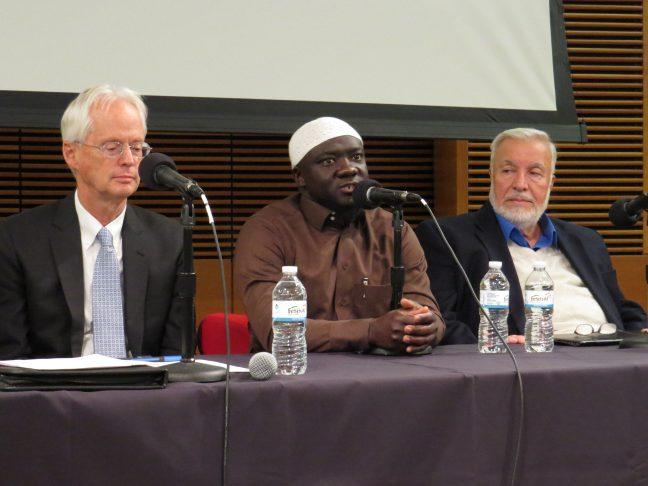Through legal, historical and social activism lenses, experts explored ways of combating Islamophobia in a panel Monday at the Discovery Building.
Andy Diaz, Muslim Students Association brother’s coordinator, introduced the panel by contextualizing the current political and social climate toward Islam.
The past few weeks, Diaz said, have been challenging for the association’s members, citing President Donald Trump’s executive order on immigration and the whole election season as particularly “troubling.”
In wake of all of the recent news, he said a “wave of media personnel” has contacted the association for its reactions to any Islam or Muslim-related news.
“Honestly, that can become a very tiring and exhausting ordeal, to always talk about how scared or nervous you feel about what may happen in the future to you or those of the same creed as yourself,” Diaz said.
To combat Islamophobia requires active dialogue and action by both the Madison and Muslim communities, Diaz said.
John Vaudreuil, U.S. Attorney for the Western District of Wisconsin, encouraged people to consider the difference between “bad policy” and “unconstitutional.”
He said the remedies for each are significantly different, with political action being the solution for the former and faith in our shared-power system of government for the latter.
Dane County Board stands in solidarity with Muslim community
“As hard as it may be to quell your fears, your concerns, we actually have to trust in our constitutional system,” Vaudreuil said.
Since Trump announced the executive order, courts have filed lawsuits in multiple major cities across the country. Vaudreuil said actions taken in the past weeks should give attendees faith the system is working.
Congress would have to fund the thousands of additional immigration agents and the judicial courts have to decide the constitutionality of the executive order, he said.
Vaudreuil also said he and other members of the legal system want to investigate and prosecute hate crimes, but can only do so when people come forward to report them.
Vaudreuil had one simple message countering hate speech: “You are welcome, you are our neighbors. We will protect you, and we will prosecute the cowards who chose to send a different message.”
In photos: Madison community stands in solidarity with refugees
In Photos: UW students gather on Bascom to protest refugee executive order
He encouraged attendees to remain engaged.
“That’s how we defeat the anger. That’s how we defeat the fear,” Vaudreuil said. “It is hard to hate when there’s a face you’re being asked to hate, the actual human being, not this name, this religion, these people but an actual person.”
The founder of Muslim Youth of Madison, Nasra Wehelie, stressed the need for compassion. She said Islamophobia is a disease of fear in need of a C.U.R.E. — an acronym encouraging people to “connect, understand, report and engage.”
Imam Alhagie Jallow, an expert on the Qur’an, spoke to the contentious conflation of Islam and terrorism. He said the religion is based upon peace and being a good Muslim is defined by an opposition to violence.
Though an institution like Islam may have bad members, it doesn’t make the institution itself bad, Jallow said.
“If you want a person to be a bad person, find a negative name for them,” Jallow said.
Muslim students and allies discuss impact of election results
Islamophobia is not as new a phenomenon as some may assume, said Golnar Nikpour, an A.W. Mellon postdoctoral fellow at UW. She said the dubious racial logic of thinking the world is divided into “pure, unadulterated hierarchies,” is called “race-thinking.”
Nikpour said old language that was clearly racist may not be as present today, but similar concepts persist. She criticized Trump’s adviser Steve Bannon — who she described as “not incorrectly represented by SNL as the grim reaper” — for being a proponent of a violently anti-Islamic, culturally pure perspective.
“There’s no quick fix for this sort of dangerous and honestly genocidal worldview, but that doesn’t mean that we shouldn’t try,” Nikpour said.
To combat race-thinking, Nikpour proposed thinking through a historical-political lens.
A small, well-funded group of people promote Islamophobia as part of a much larger plan, Safi Kaskas, an expert in Abrahamic religions, said. He added this “plan” seeks to eliminate Islam in the future.
UW students raised concerns about these bigger forces and the challenges of addressing ignorance about Islam.
Kaskas met UW senior Samir Idrissi with a hug when he described his own struggles growing up in northern Wisconsin with two parents of different religions while Jallow, the Qur’an expert, provided words of comfort and strength.













